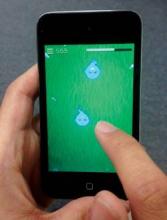It seems the glass is half-full and half-empty when it comes to mental health apps. What data there are suggest that apps to treat or prevent anxiety, depression, stress, or substance abuse can work, but the paucity of good research makes it difficult to know which ones to recommend.
A recent randomized trial in 78 highly trait-anxious (but not diagnosed) adults found that a single session of using an experimental game app for attention-bias modification training (ABMT) significantly reduced acute stress responses and improved mood, compared with those of a control group (Clin. Psychol. Sci. 2014 March 6 [doi:10.1177/2167702614522228]). The work is preliminary but should not be taken for granted. A separate review of the literature on more than 3,000 mental health apps available to consumers found evidence for efficacy for only five apps in eight trials of less-than-desirable-quality that at least included a control group or pretest and posttest assessments (J. Med. Internet Res. 2013;15:e247).
The gamified ABMT app, which uses features such as animated characters, sound effects, and awarding of points to make it more of a game, recruited adult university students who scored high on anxiety assessments and randomized them to either a shorter training session on the app or a placebo app (25 minutes of game play with 20 minutes of rest breaks) or a longer training session on the app or a control (45 minutes of game play with brief breaks given as needed).
Validated assessments immediately before and after showed generally positive results, but with some surprises, reported Tracy A. Dennis, Ph.D., who is professor of psychology at Hunter College in New York City, and Laura J. O’Toole of the City University of New York.
ABMT seeks to reduce anxiety by reducing a person’s exaggerated attention to threats (also known as "threat bias"). For example, the app may show two faces – one menacing and the other neutral or pleasant – and use mechanisms such as game maneuvers or points to reinforce attention away from the threatening face (or "threat prompt"). Only the long ABMT session produced significantly less biased attention to threats in the app. Subjects in the long ABMT group also showed less difficulty disengaging from threat (compared with those in either the long control group or the short ABMT), which was associated with less negative mood and less nervous speech.
Unexpectedly, participants in the short ABMT session had greater difficulty disengaging from threat after the session, compared with controls, Dr. Dennis and Ms. O’Toole found. The short ABMT session, however, significantly reduced participants’ subjective reports of anxiety, compared with those by control groups or the long ABMT group.
Several previous studies of modifying ABMT for use on mobile devices or via the Internet reported mixed results and didn’t assess participants’ willingness to keep using the app, the investigators noted. They hope that turning it into a video game–like app may make it easy, inexpensive, and appealing for youths and young adults to use without stigma. Future studies should look at more sophisticated versions of the app used by clinically diagnosed populations in out-of-laboratory settings for different amounts of time, the investigators suggested.
In an earlier review of the literature on mental health apps, Tara Donker, Ph.D., and her associates reviewed 4,997 abstracts and excluded studies that targeted a medical disorder, that didn’t include outcomes data, or that had to be downloaded first to a computer before transfer to a mobile device. The remaining eight studies included 227 participants, reported Dr. Donker of the University of New South Wales, Sydney, Australia, and her associates.
Four trials focused on three apps assessing depression (Mobilyze!, mobiletype, and Get Happy Program), three trials focused on the Mobile Stress Management app that measured stress as a primary outcome, and one trial focused on the DBT Coach app for substance use. None of these appears to be commercially available in the United States.
The within-group effects sizes for the apps ranged from 0.29 to 2.28, and the between-group effects sizes ranged from 0.01 to 0.48 using validated mental health scales in intent-to-treat analyses. These are promising results suggesting that mobile health apps can help reduce depressive symptoms and "caseness," stress, anxiety, and substance use, but the overall mediocre quality of the studies means the findings need to be replicated, the investigators said.
Users gave the apps moderate to high ratings for helpfulness, usability, and satisfaction. Adherence rates (in the studies that reported them) were high, and higher than seen previously with Internet-based interventions. Technical problems such as battery failure, connectivity problems, or the app freezing were the main reason app use was interrupted.



